
George William Peppard was an American actor. He secured a major role as struggling writer Paul Varjak when he starred alongside Audrey Hepburn in Breakfast at Tiffany's (1961), and later portrayed a character based on Howard Hughes in The Carpetbaggers (1964). On television, he played the title role of millionaire insurance investigator and sleuth Thomas Banacek in the early-1970s mystery series Banacek. He played Col. John "Hannibal" Smith, the cigar-smoking leader of a renegade commando squad in the 1980s action television series The A-Team.

Cynthia Cristina Ferrare is an American fashion model, actress, author and talk-show host. She had lead roles in several films in the late-1960s and early-1970s, including the 1968 comedy The Impossible Years and the 1972 Western film J. W. Coop, as well as portraying the titular character in Juan López Moctezuma's horror film Mary, Mary, Bloody Mary.

Richard Owen Fleischer was an American film director whose career spanned more than four decades, beginning at the height of the Golden Age of Hollywood and lasting through the American New Wave.

Yvette Carmen Mimieux was an American film and television actress who was a major star of the 1960's and 1970's. Her breakout role was in The Time Machine (1960). She was nominated for three Golden Globe Awards during her acting career.
Martin Nelson Ransohoff was an American film and television producer, and member of the Ransohoff family.
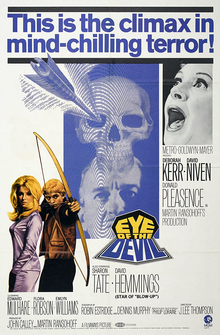
Eye of the Devil, also known by its working title 13 or Thirteen, is a 1966 British mystery horror film directed by J. Lee Thompson and starring Deborah Kerr, David Niven, Donald Pleasence and Sharon Tate. Adapted from the 1964 novel Day of the Arrow by Philip Loraine, the movie is set in rural France. It was shot at the Château de Hautefort and in England. The film's plot concerns a family inheritance of an estate shrouded by a mysterious and highly ritualistic veil of secrets, and the investigation that follows in trying to uncover the meaning of these ominous peculiarities.
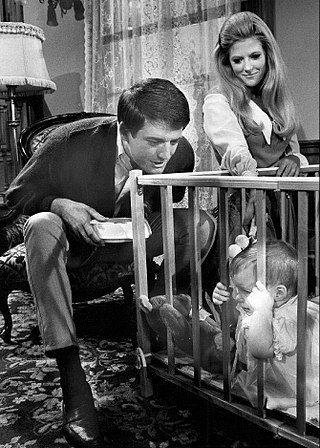
Michael Fedderson, known as Mike Minor, was an American actor best known for his role as Steve Elliott on Petticoat Junction (1966–1970).

The Little Hut is a 1957 British romantic comedy film made by MGM starring Ava Gardner, Stewart Granger and David Niven. It was directed by Mark Robson, produced by Robson and F. Hugh Herbert, from a screenplay by Herbert, adapted by Nancy Mitford from the play La petite hutte by André Roussin.

The Impossible Years is a 1965 comedy play written by Robert Fisher and Arthur Marx, son of comedian Groucho Marx. After two previews, the Broadway production, directed by Arthur Storch, opened on October 13, 1965, at the Playhouse Theatre, where it ran for 670 performances. The original cast included Alan King, Sudie Bond, Bert Convy, Neva Small, and Scott Glenn. Ed McMahon temporarily assumed the role of Dr. Jack Kingsley for eight performances from January 17, 1966, to January 22, 1966, so Alan King could honor a previously scheduled Miami night club engagement.

The Seven Minutes is a 1971 American drama movie directed and produced by Russ Meyer. The movie was based on the 1969 novel of the same name by Irving Wallace.
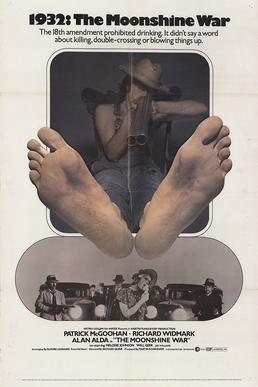
The Moonshine War is a 1970 American crime comedy-drama film directed by Richard Quine, based on the 1969 novel of the same name by Elmore Leonard. It stars Patrick McGoohan, Richard Widmark, Alan Alda, and Will Geer.

Lori Saunders is an American film and television actress, probably best known for her role as Bobbie Jo Bradley in the television series Petticoat Junction (1965–1970).

George Wells was an American screenwriter and producer, best known for making light comedies and musicals for MGM.

The Last Run is a 1971 American action film shot in Portugal, Málaga and elsewhere in Spain directed by Richard Fleischer, starring George C. Scott, Tony Musante, Trish Van Devere, and Colleen Dewhurst.

Where the Spies Are is a 1966 British comedy adventure film directed by Val Guest and starring David Niven, Françoise Dorléac, John Le Mesurier, Cyril Cusack and Richard Marner. It was based on the 1964 James Leasor book Passport to Oblivion, which was also the working title of the film. MGM intended to make a Jason Love film series, but the idea was shelved.
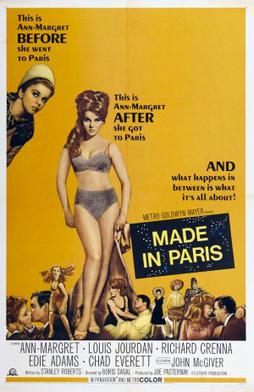
Made in Paris is a 1966 American romantic-comedy film starring Ann-Margret, Louis Jourdan, Richard Crenna, Edie Adams, and Chad Everett. The film was written by Stanley Roberts and directed by Boris Sagal.

The King's Thief is a 1955 swashbuckling CinemaScope adventure film directed by Robert Z. Leonard, who replaced Hugo Fregonese during filming. Released on August 5, 1955, the film takes place in London at the time of Charles II and stars Ann Blyth, Edmund Purdom, David Niven, George Sanders and Roger Moore.

The Boy Friend is a 1971 British musical comedy film written and directed by Ken Russell, based on the 1953 musical of the same name by Sandy Wilson. The film stars Twiggy, Christopher Gable, Tommy Tune, and Max Adrian, with an uncredited appearance by Glenda Jackson. Metro-Goldwyn-Mayer made extensive edits to the film for its American release. The missing material was restored and the film was re-released in 1987. The Boy Friend was released on DVD on 12 April 2011.
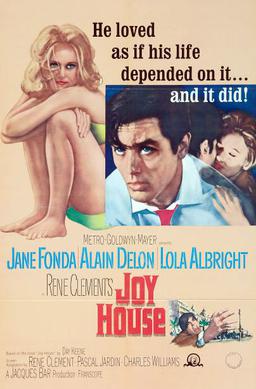
Joy House is a 1964 French mystery–thriller film starring Jane Fonda, Alain Delon and Lola Albright. It is based on the 1954 novel of the same name by Day Keene.
Earl Felton (1909–1972) was an American screenwriter.


















